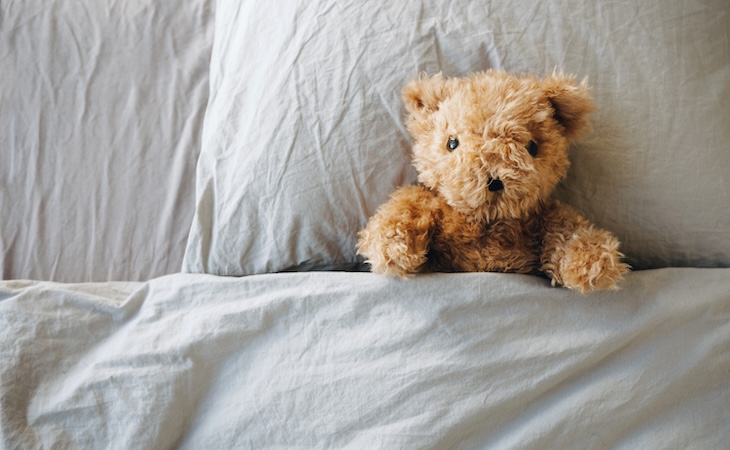As a child, chances are you slept with a stuffed animal or fuzzy blanket that you loved. But if you’re years into adulthood and still find yourself snuggling up to your childhood teddy bear, it turns out you’re not alone.
Forty percent of adults admit to still sleeping with a stuffed animal or blanket from their childhood, according to a survey commissioned by Build-A-Bear Workshop. Is it healthy to sleep with a stuffed animal as an adult, though? Here’s what the experts have to say.
The science behind how stuffed animals help you sleep
Doctors refer to stuffed animals, blankets, and the like as “transitional objects.” They’re something that young children curl up with to feel safe and secure, especially when they’re away from a parent or caregiver. Stuffed animals also help kids transition from dependence to independence, hence the name.
Once a connection to the object is made, kids learn to turn to it to help them cope with their anxieties. “Over time, the child learns that they’re able to cuddle with the stuffed animal and feel a sense of comfort, which aids in sleep,” says Krystal Kavita Jagoo, a Toronto-based mental health professional and registered social worker. Eventually, the child will start associating the stuffed animal with bedtime.
Just as it does for children, a stuffed animal can provide a sense of comfort and security to adults in times of extreme stress, Jagoo says. “For a lot of individuals as they get older, they learn to rely on some form of self-soothing to cope with distress,” she says. “An example of that might be cuddling a stuffed animal.”
Vivian C. Seltzer, psychologist and professor of human development and behavior at the University of Pennsylvania, tells the Chicago Tribune that it’s particularly common for young adults to keep transitional objects from childhood.
“Millennials are having this feeling of moving from one place to another instead of a home,” she explains. “This is a time of being alone and going away to school or a new job.” All of that moving around makes some people long for an “old friend” that reminds them of a more secure time.
When sleeping with a stuffed animal becomes an issue
Here’s the good news: Experts say it’s totally normal to cuddle with your beloved stuffed dog every night—even if you no longer sleep in your childhood bed. “It’s nothing unusual,” Stanley Goldstein, child clinical psychologist, tells the Chicago Tribune. Adults have fears too, he says, “and whatever helps us face these fears, it’s OK.”
And whatever helps us get a better night’s sleep—especially without the aid of drugs or alcohol—could be seen as a positive.
That said, if your attachment to your stuffed animal impacts your work or relationships, that’s usually a sign of a deeper issue that needs to be addressed.
For example, do you turn to your teddy bear for support rather than your S.O.? That could signal your partner isn’t providing the comfort they should be in the relationship, Kathryn Smerling, PhD, tells Shape. Avoiding bringing home partners or friends because you’d have to ‘fess up about your attachment could also be limiting your relationships and life experiences, Alisa Ruby Bash, PsyD, licensed marriage and family therapist, also tells the magazine.
How to let go of your stuffed animal (if you want to)
Breakups are hard, even when they involve parting ways with an inanimate object. Before you decide to retire your fuzzy friend, assess your relationship with your stuffed animal and what it would mean for you if you stopped sleeping with it, suggests Jagoo.
Then, acknowledge your feelings and what will happen once you let go. Will you be stressed out more? Will you feel a loss? “Try to understand what the factors are,” says Jagoo. “[Find a way] to make peace with that choice and find closure in the process.”
Know that you don’t necessarily need to quit cold turkey. Jagoo recommends keeping your stuffed pal within reach, say on a shelf or your desk, and squeezing it any time you feel stressed. “It still provides some sense of comfort because you can look across the room and see the stuffed animal nearby,” says Jagoo. “Should you want it at some point, it’s easy to go pick it up.”
FAQs
How many adults sleep with stuffed animals?
About 40% of adults admit to still sleeping with a stuffed animal or blanket from their childhood, according to a survey conducted by Build-A-Bear Workshop.
Is it OK to sleep with a stuffed animal?
Experts say it’s OK to sleep with your stuffed animal every night—even if you no longer sleep in your childhood bed. However, if your attachment to your stuffed animal impacts your work or relationships, that’s usually a sign of a deeper issue that needs to be addressed.
A weighted blanket could help soothe your stress and make it easier to fall—and stay—asleep. Here’s how weighted blankets work.




